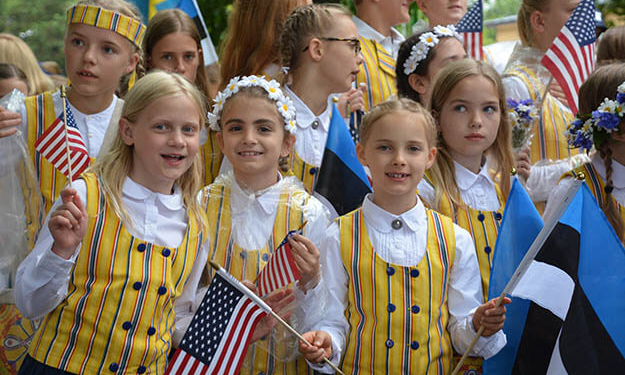Children’s choir Laulurõõm at Noorte Laulupidu last summer. Photo by Merle Jalakas
As early spring snow falls over New York City, I can’t help but feel close to icecold Tallinn, where I just came from a concert tour with Esto-Atlantis Choir.
My mother, Maaja Roos, conducted the works of my grandmother and great-grandfather in St. John’s Church by Freedom Square, where centennial logos sparkle all around. My experience of fatherland excitement over continuous Eesti 100 celebrations flows into that of the hometown, where we’re all looking forward to the events of the Estonian Cultural Days.
Capping the weekend is the grand finale of the Esto-Atlantis Concert, which is the third and final performance of a concert series that started in Tallinn, continued the next day at Stockholm’s St. Jacob’s Church, and culminates in a performance at Lincoln Center’s Alice Tully Hall on Easter Sunday. Unlike the first two concerts which incorporated only the Estonian singers from Heli Jürgenson’s Estonia Seltsi Segakoor and their Swedish counterparts, Kraftkällan, led by Veikko Kiiver — the New York performance will feature our own Estonian House choir and children’s choir Laulurõõm.
The afternoon will begin with a musical introduction by youth violin ensemble Magic Strings. The trio, ranging from age 11-14, represents some of Estonia’s best young talent. Violinists Ingmar Kiviloo, Karoliina Kuppart and Ursula Melsas will be joined by pianist Susanna Liisa Onoper. Also performing as the audience takes their seats is Kleer Suursild on flute, who will then take her place in the alto section of Esto-Atlantis Choir.
The clock strikes 2:00 and the 47 members of Laulurõõm – children aged 5-15, from the tristate area to as far away as Virginia – walk out onstage. Still fresh from the summer song festival, they’re no strangers to grand performances, but this is their concert hall debut — and what a concert hall! Their excitement is sublime as they prepare to sing six Estonian folk songs arranged by Helen Tobias-Duesberg. The songs tell stories about brothers leaving home in wartime, storks returning home in summertime, and the people persevering through servitude. They like the sad ones best.
The children finish singing and take their seats in the audience, and Maaja plays a piano homage written to Arvo Pärt from Helen, which is followed by a Pärt a cappella choral piece, Morning Star. Then 100 singers will fill the stage for the climax of this Eesti 100 celebration: Helen’s Reekviem.
After the Tallinn performance, music critic Ene-Reet Ehala remarked, “Reekviem captivates me each time it is conducted by Maaja. What mystery, mysticism, radiance, and enchantment comes across — in which the tragedy is not overwhelming but rather uplifting.”
Reekviem features the soloists Arete Teemets, soprano; Veikko Kiiver, tenor; and Alar Pintsaar, bass. Norwaybased organist Ines Maidre will accompany Reekviem and the concert’s concluding pieces, Rudolf Tobias’ “Otsekui hirv” and “Eks teie tea.” A concert organist of international stature, Ines is an acclaimed interpreter of Tobias. She says she finds it remarkable how his freedom of music flows from composer to composer to conductor.
I hope you will join me in honoring our shared heritage through our greatest cultural tradition of all, choral music.
Leila Roos
Leila Roos sings alto in the New Yorgi Eesti Haridusseltsi Segakoor and is the assistant conductor of Laulurõõm. She will perform in the Esto-Atlantis choir and conduct the children’s choir at Lincoln
Center.













